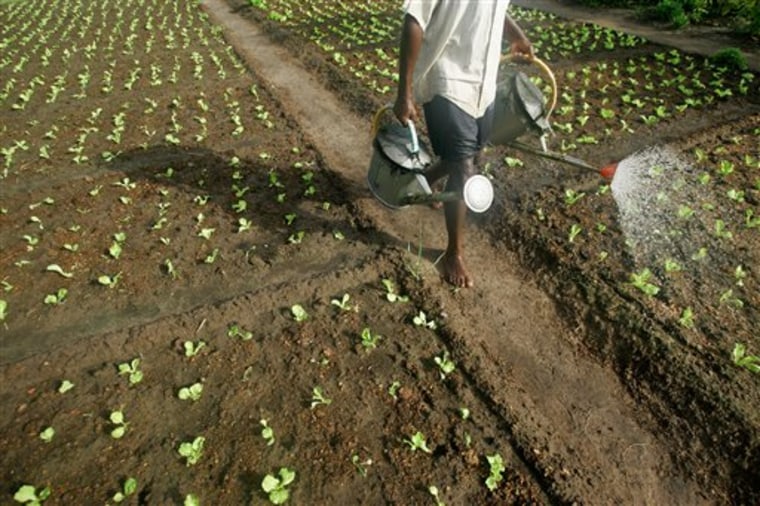World leaders at a U.N. summit pledged Thursday to reduce trade barriers and boost agricultural production to combat a food crisis that is spreading hunger and violent unrest across the world.
After three days of wrangling, delegates from about 180 countries approved a declaration resolving to ease the suffering caused by soaring food prices and step up investment in agriculture.
The summit also struck a balance on the contentious issue of biofuels, recognizing that there are both "challenges and opportunities" in using plant material for fuel.
A few Latin American countries raised strong objections to parts of the declaration.
Cuba was disappointed the document didn't criticize the long-standing U.S. embargo against the Communist-ruled island. Argentina was unhappy it didn't blame farm subsidies in the U.S., European Union and other Western food-producers for a major role in driving up prices.
The declaration called for swift help for farmers in poor countries who need seed and fertilizers in time for the approaching planting season.
"We took the measure of the problem of hunger in the world correctly," said Jacques Diouf, head of the Rome-based U.N. Food and Agriculture Organization, which hosted the summit.
"I think we have an essentially political declaration" of intent to ease hunger, Diouf said.
Goal was not monetary
He also said that although the gathering wasn't a conference for pledging donations, billions of dollars from countries, regional banks and the World Bank had been promised in recent days.
U.N. Secretary-General Ban Ki-moon had told the summit such measures as import taxes and export restrictions must be minimized to alleviate hunger, and the document called for "reducing trade barriers and market-distorting policies."
U.S. Agriculture Secretary Ed Schafer welcomed the declaration on biofuels, saying the United States remains "firmly committed to the sustainable production and use of biofuels, both domestically and globally."
The biofuel issue was a volatile one at the meeting.
The conference struck a balance on the fuels made from crops such as sugar cane and corn, saying that "in-depth studies" are necessary to ensure that the environmentally friendly energy source does not take food off the table.
Brazil, the United States and other big producers of biofuels disagree on which crops are better-suited to produce the energy source and how much they contribute to driving up food prices.
Cuba's delegation called the document "a step in the process to eradicate hunger," welcoming the declaration despite failing to include language criticizing embargoes. The United States, a huge aid donor, opposes efforts to condemn its embargo on doing business with Cuba.
Supply and demand
The summit was called by the U.N. Food and Agriculture Organization to discuss securing food supplies in the face of rising demand — especially from rapidly developing Asian countries — poor harvests and rising fuel costs.
Those factors have contributed to a doubling of commodity prices over the last couple of years which the World Bank says has put 100 million people at risk of joining the 850 million already going hungry.
The Organization for Economic Cooperation and Development sees prices of rice, corn and wheat retreating from peaks but still up to 50 percent higher in the next decade. The FAO says food production must rise 50 percent by 2050 to meet demand.
Some questioned the use of the summit. Senegal President Abdoulaye Wade, a skeptic of international attempts to solve hunger and critic of the FAO, said it was a waste of time.
"There's been a brutal rise in prices (of food) and we were told there was a threat hanging over the world and all the heads of state were called to attend. I thought it was going to be to answer the question about what should be done, but it wasn't that at all," Wade told Reuters.
"It was just a conference like any other and that's why I was disappointed," said Wade, one of more than 40 heads of state and government who attended the Rome summit.
British-based poverty campaign group Oxfam was more upbeat.
"It would be very easy to dismiss this food summit as a talking shop," said Barbara Stocking, head of Oxfam GB. "But it could be a stepping stone to better policies and the money to implement them."
Although the summit was not meant to produce promises of aid or set new global policies, it has set the tone on food and hunger for more concrete talks in the coming months.
U.N. action plan due by July
Group of Eight leaders meet in Japan next month, by which time a food crisis task force set up by U.N. Secretary-General Ban Ki-moon is due to have issued a concrete action plan.
The summit's talks on the potential benefits to poor farmers from new global trade rules will feed into a push to conclude the so-called Doha round of World Trade Organization talks, which reach a potentially conclusive phase in the coming weeks.
The United States, which is diverting increasing amounts of its maize harvest into automobile fuel, came under attack from some countries and poverty campaigners who have called for a rethink of policies to promote fuel made from foodstuffs.
Washington acknowledges that the spread of biofuels has added to the demand for crops, especially maize, and contributed to food inflation, but only by a marginal amount.
